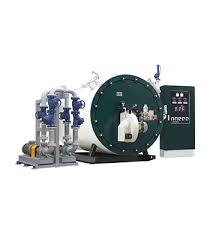
Oct . 16, 2024 20:18 Back to list
thermal oil heater pdf
Understanding Thermal Oil Heaters A Comprehensive Overview
Thermal oil heaters, or thermal fluid heaters, play a crucial role in various industrial processes requiring efficient heat transfer at high temperatures. Unlike traditional steam boilers, which generate steam to transfer heat, thermal oil heaters circulate hot oil, making them suitable for a wide range of applications in industries such as chemical processing, food production, and oil refining.
The Working Principle
The operation of a thermal oil heater is relatively straightforward. It consists of a combustion chamber where fuel is burned, generating thermal energy. This heat is transferred to the thermal oil circulating through a closed-loop system, typically using a pump. In this system, the oil absorbs the heat and moves to the heat exchanger, where it transfers the thermal energy to the medium requiring heating.
One of the significant advantages of thermal oil heaters is their ability to operate at high temperatures (up to 400°C or more) without the need for pressure. This characteristic allows for safer operations compared to steam-based systems, where pressure builds up significantly and requires strict safety measures.
Key Components
A typical thermal oil heater includes several key components
1. Furnace/Combustion Chamber This is where the fuel is burned to generate heat. The design of the furnace can affect the efficiency and emissions of the heater.
2. Thermal Oil The choice of thermal oil is vital. It must have a high boiling point and good heat transfer characteristics. Common options include synthetic oils and mineral oils.
3. Heat Exchanger This device transfers the heat from the thermal oil to the process fluid or space heating system. It is crucial for maintaining efficient thermal transfer.
4. Pumps Essential for circulating the thermal oil throughout the system, pumps must be durable and capable of handling high temperatures.
Advantages of Thermal Oil Heaters
thermal oil heater pdf

1. High Efficiency Thermal oil heaters operate with high thermal efficiencies, often exceeding 90%. This leads to lower fuel consumption and reduced operating costs.
2. Versatility They can accommodate a wide variety of heat transfer applications, making them suitable for many processes, including heating, distillation, and drying.
3. Safety Operating at low pressure reduces the risk of explosions and other hazards associated with high-pressure steam systems.
4. Easy Maintenance Since thermal oil heaters do not require extensive boiler room infrastructure, maintenance is generally more manageable and cost-effective.
5. Environmental Impact With the right design and control systems, thermal oil heaters can achieve lower emissions, contributing to greener industrial processes.
Applications
Thermal oil heaters are used in various industries, including
- Chemical Processing For heating reactors and maintaining temperature in critical reactions. - Food Industry Used in frying, pasteurizing, and drying processes, where precise temperature control is necessary.
- Plastics and Rubber Manufacturing For maintaining process temperature in extrusion and molding applications.
- Oil and Gas Applied in bitumen processing and thermal recovery operations.
Conclusion
Thermal oil heaters are indispensable in modern industrial applications due to their efficiency, safety, and versatility. Understanding their operation, components, and advantages can aid businesses in selecting the right thermal fluid heating solutions tailored to their specific needs. As industries evolve and seek more sustainable methods of operation, thermal oil heaters will undoubtedly continue to play a significant role in achieving energy-efficient and environmentally friendly processes. Whether initiating a new project or upgrading existing systems, investing in a thermal oil heater can lead to enhanced performance and substantial cost savings in the long run.
-
Efficient Biomass Fired Hot Water Boiler | AI Heating Solution
NewsAug.01,2025
-
High-Efficiency Gas Thermal Oil Boilers | HPT Models
NewsJul.31,2025
-
Oil Fired Hot Water Boilers Sale - High Efficiency & Affordable
NewsJul.31,2025
-
High-Efficiency Commercial Oil Fired Steam Boiler for Industry
NewsJul.30,2025
-
High-Efficiency Biomass Fired Thermal Oil Boiler Solutions
NewsJul.30,2025
-
High Efficiency Gas Fired Thermal Oil Boiler for Industrial Heating
NewsJul.29,2025
Related PRODUCTS






















